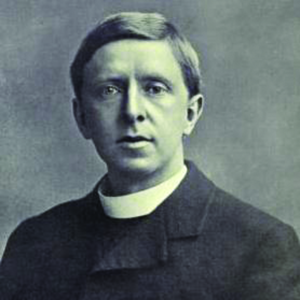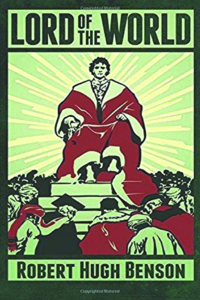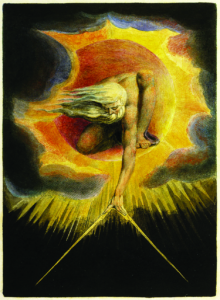More than a century ago, Monsignor Robert Hugh Benson foresaw the rise of secular humanism, the contraction of the Catholic Church, and the coming of the Antichrist…
By ITV Staff
 Editor’s Note: The passage below is from the novel Lord of the World, written by the English Catholic convert Monsignor Robert Hugh Benson (the son of the Anglican Archbishop of Canterbury) in 1907. He attempts a vision of the world more than a century in the future — in the early 21st century… our own time… predicting the rise of Communism, the fall of faith in many places, the advance of technology (he foresees helicopters), and so forth, up until… the Second Coming of the Lord, with which his vision ends. For this reason, and also because Pope Benedict and Pope Francis have repeatedly cited Benson’s book, saying its clarification of the danger of a type of humanitarianism without God is a true danger that we do face, we are printing selections from it in ITV, now and in the months ahead.
Editor’s Note: The passage below is from the novel Lord of the World, written by the English Catholic convert Monsignor Robert Hugh Benson (the son of the Anglican Archbishop of Canterbury) in 1907. He attempts a vision of the world more than a century in the future — in the early 21st century… our own time… predicting the rise of Communism, the fall of faith in many places, the advance of technology (he foresees helicopters), and so forth, up until… the Second Coming of the Lord, with which his vision ends. For this reason, and also because Pope Benedict and Pope Francis have repeatedly cited Benson’s book, saying its clarification of the danger of a type of humanitarianism without God is a true danger that we do face, we are printing selections from it in ITV, now and in the months ahead.
Lord of the World
By Robert Hugh Benson (1907)
 Chapter V, Part 1 (continued)
Chapter V, Part 1 (continued)
Again Percy was conscious of that slight touch of fear at the mention of that name.
“I understand there is to be peace,” he said.
The girl rose and her husband with her.
“Yes,” she said, almost compassionately, “there is to be peace. Peace at last.” (She moved half a step towards him, and her face glowed like a rose of fire. Her hand rose a little.) “Go back to London, Father Franklin, and use your eyes. You will see him, I dare say, and you will see more besides.” (Her voice began to vibrate.) “And you will understand, perhaps, why we have treated you like this—why we are no longer afraid of you—why we are willing that my mother should do as she pleases. Oh! you will understand, Father Franklin, if not to-night, to-morrow; or if not to-morrow, at least in a very short time.”
“Mabel!” cried her husband. The girl wheeled, and threw her arms round him, and kissed him on the mouth. “Oh! I am not ashamed, Oliver, my dear. Let him go and see for himself. Goodnight, Father Franklin.”
As he went towards the door, hearing the ping of the bell that someone touched in the room behind him, he turned once more, dazed and bewildered; and there were the two, husband and wife, standing in the soft, sunny light, as if transfigured. The girl had her arm round the man’s shoulder, and stood upright and radiant as a pillar of fire; and even on the man’s face there was no anger now nothing but an almost supernatural pride and confidence. They were both smiling.
Then Percy passed out into the soft, summer night.
II
Percy understood nothing except that he was afraid, as he sat in the crowded car that whirled him up to London. He scarcely even heard the talk round him, although it was loud and continuous; and what he heard meant little to him. He understood only that there had been strange scenes, that London was said to have gone suddenly mad, that Felsenburgh had spoken that night in Paul’s House.
He was afraid at the way in which he had been treated, and he asked himself dully again and again what it was that had inspired that treatment; it seemed that he had been in the presence of the supernatural; he was conscious of shivering a little and of the symptoms of an intolerable sleepiness. It was scarcely strange to him that he should be sitting in a crowded car at two o’clock of a summer dawn.
Thrice the car stopped, and he stared out at the signs of confusion that were everywhere; at the figures that ran in the twilight between the tracks, at a couple of wrecked carriages, a tumble of tarpaulins; he listened mechanically to the hoots and cries that sounded everywhere.
As he stepped out at last on to the platform, he found it very much as he had left it two hours before. There was the same desperate rush as the car discharged its load, the same dead body beneath the seat; and above all, as he ran helplessly behind the crowd, scarcely knowing whither he ran or why, above him burned the same stupendous message beneath the clock. Then he found himself in the lift, and a minute later he was out on the steps behind the station.
There, too, was an astonishing sight. The lamps still burned overhead, but beyond them lay the first pale streaks of the false dawn. The street that ran now straight to the old royal palace, uniting there, as at the centre of a web, with those that came from Westminster, the Mall, and Hyde Park, was one solid pavement of heads. On this side and that rose up the hotels and “Houses of Joy,” the windows all ablaze with light, solemn and triumphant as if to welcome a king; while far ahead against the sky stood the monstrous palace outlined in fire, and alight from within like all other houses within view. The noise was bewildering. It was impossible to distinguish one sound from another. Voices, horns, drums, the tramp of a thousand footsteps on the rubber pavements, the sombre roll of wheels from the station behind—all united in one overwhelmingly solemn booming, overscored by shriller notes.
It was impossible to move. He found himself standing in a position of extraordinary advantage, at the very top of the broad flight of steps that led down into the old station yard, now a wide space that united, on the left the broad road to the palace, and on the right Victoria Street, that showed like all else one vivid perspective of lights and heads. Against the sky on his right rose up the illuminated head of the Cathedral Campanile. It appeared to him as if he had known that in some previous existence.
He edged himself mechanically a foot or two to his left, till he clasped a pillar; then he waited, trying not to analyze his emotions, but to absorb them.
Gradually he became aware that this crowd was as no other that he had ever seen. To his psychical sense, it seemed to him that it possessed a unity unlike any other. There was magnetism in the air. There was a sensation as if a creative act were in process, whereby thousands of individual cells were being welded more and more perfectly every instant into one huge sentient being with one will, one emotion, and one head. The crying of voices seemed significant only as the stirrings of this creative power which so expressed itself. Here rested this giant humanity, stretching to his sight in living limbs so far as he could see on every side, waiting, waiting for some consummation—stretching, too, as his tired brain began to guess, down every thoroughfare of the vast city.
He did not even ask himself for what they waited. He knew, yet he did not know. He knew it was for a revelation—for something that should crown their aspirations, and fix them so forever.
He had a sense that he had seen all this before; and, like a child, he began to ask himself where it could have happened, until he remembered that it was so that he had once dreamt of the Judgment Day—of humanity gathered to meet Jesus Christ— Jesus Christ! Ah! how tiny that Figure seemed to him now—how far away—real indeed, but insignificant to himself—how hopelessly apart from this tremendous life! He glanced up at the Campanile. Yes; there was a piece of the True Cross there, was there not?—a little piece of the wood on which a Poor Man had died twenty centuries ago… Well, well. It was a long way off…
He did not quite understand what was happening to him. “Sweet Jesus, be to me not a Judge but a Saviour,” he whispered beneath his breath, gripping the granite of the pillar; and a moment later knew how futile was that prayer.
It was gone like a breath in this vast, vivid atmosphere of man. He had said Mass, had he not? this morning—in white vestments.—Yes; he had believed it all then—desperately, but truly; and now…
To look into the future was as useless as to look into the past. There was no future, and no past: it was all one eternal instant, present, and final… Then he let go of effort and again began to see with his bodily eyes.
* * * * *
The dawn was coming up the sky now, a steady soft brightening that appeared in spite of its sovereignty to be as nothing compared with the brilliant light of the streets. “We need no sun,” he whispered, smiling piteously; “no sun or light of a candle. We have our light on earth—the light that lighteneth every man….”
The Campanile seemed further away than ever now, in that ghostly glimmer of dawn—more and more helpless every moment, compared with the beautiful vivid shining of the streets.
Then he listened to the sounds, and it seemed to him as if somewhere, far down eastwards, there was a silence beginning. He jerked his head impatiently, as a man behind him began to talk rapidly and confusedly. Why would he not be silent, and let silence be heard?… The man stopped presently, and out of the distance there swelled up a roar, as soft as the roll of a summer tide; it passed up towards him from the right; it was about him, dinning in his ears. There was no longer any individual voice: it was the breathing of the giant that had been born; he was crying out too; he did not know what he said, but he could not be silent. His veins and nerves seemed alight with wine; and as he stared down the long street, hearing the huge cry ebb from him and move toward the palace, he knew why he had cried, and why he was now silent.
A slender, fish-shaped thing, as white as milk, as ghostly as a shadow, and as beautiful as the dawn, slid into sight half-a-mile away, turned and came towards him, floating, as it seemed, on the very wave of silence that it created, up, up the long curving street on outstretched wings, not twenty feet above the heads of the crowd. There was one great sigh and then silence once more.
* * * * *

God as seen by William Blake as the Architect of the world, in Ancient of Days, held in the British Museum, London
When Percy could think consciously again—for his will was only capable of efforts as a clock of ticks—the strange white thing was nearer. He told himself that he had seen a hundred such before; and at the same instant that this was different from all others.
Then it was nearer still, floating slowly, slowly, like a gull over the sea; he could make out its smooth nose, its low parapet beyond, the steersman’s head motionless; he could even hear now the soft winnowing of the screw—and then he saw that for which he had waited.
High on the central deck there stood a chair, draped, too, in white, with some insignia visible above its back; and in the chair sat the figure of a man, motionless and lonely. He made no sign as he came; his dark dressshowed vividedly against the whiteness; his head wasraised, and he turned it gently now and again from side to side.
It came nearer still, in the profound stillness; the head turned, and for an instant the face was plainly visible in the soft, radiant light. It was a pale face, strongly marked, as of a young man, with arched, black eyebrows, thin lips, and white hair.
Then the face turned once more, the steersman shifted his head, and the beautiful shape, wheeling a little, passed the corner, and moved up towards the palace.
There was an hysterical yelp somewhere, a cry, and again the tempestuous groan broke out.
(End Book I. Next month, Book II, The Encounter)





Facebook Comments